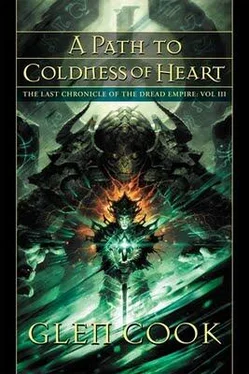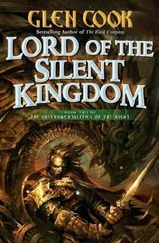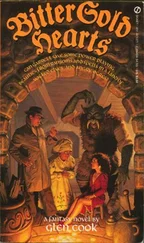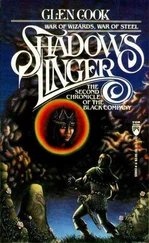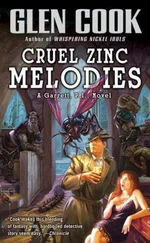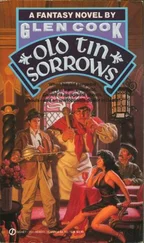GLEN COOK
A Path to Coldness of Heart
Year 1016 AFE (After the Founding of the Empire of Ilkazar)
The Price of Hubris
The prisoner clamped his jaw on a shriek. He had moved too suddenly, turning. He did swear softly. He could not work his muscles, could not build the strength to escape if his wounds did not heal. And they would not if he kept trying before the meat was ready.
A clatter rose outside. This austere suite might be his entire world for the remainder of his existence: a reward for having befriended a woman and having saved the life of a man.
It was the middle of the night. Darkness with stars fil ed the single foot square window high in the east wal , wel beyond his reach. He should be sleeping.
He lay in bed, back to the doorway, feigning sleep, when the visitors arrived. Three, from the sounds of it: one large, one smal , one delicate. Female, if fragrance did not lie.
“He heals slowly,” one said. “The physician blames his despair.”
That voice belonged to Lord Ssu-ma Shih-ka’i, commander of Shinsan’s Western Army. It was by Shih-ka’i’s grace that the prisoner lived.
A second familiar voice said, “The physician should look closer. He’s clever. He’l show you what you expect to see til you relax. Then you’l be dead.” The prisoner’s exact strategy. If only his body would heal!
Shih-ka’i said, “The physician says his wounds pierced his soul. He overreached—and it cost him everything.” Mist, Empress of the Dread Empire, considered before she replied. “It can’t be easy, living on after making so many bad decisions.”
The prisoner, who thought of himself only as “the prisoner” because of his shame, compel ed himself to relax, to breathe slow and deep. But he could not stop tears from leaking.
Thousands had died because of his decisions. A kingdom might be destroyed by civil war. His family would be fugitives already. The childwoman he had loved… Who knew? If Sherilee was clever she would insist that she had known him only as someone who visited her friend Kristen, widow of his son and mother of his grandchildren.
He thought about Inger, his wife and queen, seldom. When he did, though, it was with a grand ration of guilt. That love had died.
Inger came to mind when the pain was bad. They met the last time he lay just outside the Dark Gate, she a volunteer nurse helping heroes injured while holding the wolves of the Dread Empire at bay. In his loneliness he had asked her to become his wife.
He had lost another wife, Elana, and another lover, Fiana, before Inger.
Women who loved him did not fare wel .
“Were I in charge here,” said the woman who had been a friend, and a wife to his best friend’s wife’s brother, “and I was sure that he would recover, I would brick up the doorway.”
Lord Ssu-ma said, “I bear the man no love but that is excessive. He’s a cripple. He’l never recover ful y. And he’s nowhere where he can cause any grief.”
The prisoner had no idea where “here” was. Inside Dread Empire territory, certainly. Though Shinsan had suffered severely lately, not one inch of ground had been abandoned How were Shinsan’s wars coming? He had helped facilitate the conclusion of one and had been the loser in another. The Matayangan front must have turned favorable, too. Mist had time to visit.
She observed, “O Shing was a cripple.”
“As you say. Vigilance is required.”
The night visitors withdrew, to the prisoner’s frustration. He had hoped to hear something more heartening.
Despair led to self-flagel ation. Then, final y, feigned sleep segued into the real thing.
...
Inger watched her captains bicker over a map. They were getting nowhere. She was too tired to scold them. Too tired to ask what new disasters had them bickering.
Ethnical y, three were Nordmen from Kavelin’s old ruling class. Two were Wessons, freemen, descendants of long-ago immigrants from Itaskia. Inger was Itaskian-born, as was the sixth man, whom she had borrowed from her cousin Dane. Dane’s little army was wintering fifty miles west of Vorgreberg, too far away to provide quick support.
Regions nearer the capital were less friendly. Dane’s men suffered virulent guerril a attacks if they moved nearer to Vorgreberg. That forced them to cluster in stronger bands.
Those became a strain on local resources, which, in turn, left the locals more sympathetic to the rebels.
Inger refused to let Dane move into the city. She said she did not want to cede the countryside. In truth she did not want her uncontrol able cousin in position to control Kavelin by control ing her.
He would try, given the chance.
Power was his reason for having come to Kavelin.
Power was why she had wed Kavelin’s lonely king.
Inger sipped scalding tea.
She was a tal , handsome woman whose blond hair had begun to streak grey. Time was not the thief of her beauty.
Stress, fear, and lack of sleep were the demons responsible.
The hot tea wakened her ful y. “Silence! Thank you, gentlemen. Using the term loosely. Mr. Cleary, you talk.
Everyone else stay quiet.”
Cleary was the senior Wesson, a stout, sturdy man of thirty-three who had served King Bragi faithful y and remained loyal now that Bragi had fal en. Inger trusted him. The Nordmen and Nathan Wolf, borrowed from Dane of Greyfel s, she trusted not at al . In Wolf ’s case it was no secret that he was here to watch her because Dane no longer had faith in Josiah Gales.
“Ma’am. Your Majesty. The contention arose because General Liakopulos has gone missing. No one knows where, when, or how. He was pol ing units out west to see where they stand, now. Our discussion concerned possible hows and whys of his disappearance.”
Inger’s heart sank. This was bad news indeed, though not a surprise. Liakopulos had had little interest in supporting her. He had been Bragi’s man. He considered her incapable of, or uninterested in, pursuing Bragi’s reforms.
“What are the theories? Mr. Wolf?”
“He deserted. He didn’t want to be here anymore.”
“And the rest of you disagree?”
Two Nordmen, Sir Rengild and Sir Arnhelm, thought the truth more sinister: The Guild General had gone over to the Marena Dimura strongman, Credence Abaca. Sir Arnhelm insisted, “Those two were always cozy.” Which he found repugnant because, as a class, Nordmen considered Marena Dimura less than human woodland savages.
Colonel Abaca and his henchmen had developed massive pretensions during the reign of the lost king—a savage himself who would not distinguish between noble and ignoble.
The third Nordmen, Sir Quirre of Bolt, said nothing. With a slight sneer and shake of the head he expressed contempt for his fel ows. He believed in King Bragi’s vision.
Inger turned to the Wessons. Boyer disagreed completely with Cleary. Neither considered Liakopulos a vil ain. Cleary was sure the General just did not stop heading west when he saw a chance to leave. Boyer was sure that Liakopulos had been murdered. “And rebels didn’t do it. It wil be Greyfel s when the truth comes out. It’s a matter of who stands most to gain, Your Majesty.”
“Spoken like a true money-grubbing merchant,” Sir Arnhelm snarled. “Everything comes down to a balance sheet.”
“Yes, it does,” Inger said. There was no love for the General here. Liakopulos had kept these men in check, favoring no one, contemptuous of them al because he considered them adventurers and plunderers who cared nothing for Kavelin. Bragi, Queen Fiana, and her husband the Krief, who died when Fiana was a teen, had al stretched reason to breaking to create a nation in which al the peoples had a stake.
Читать дальше
